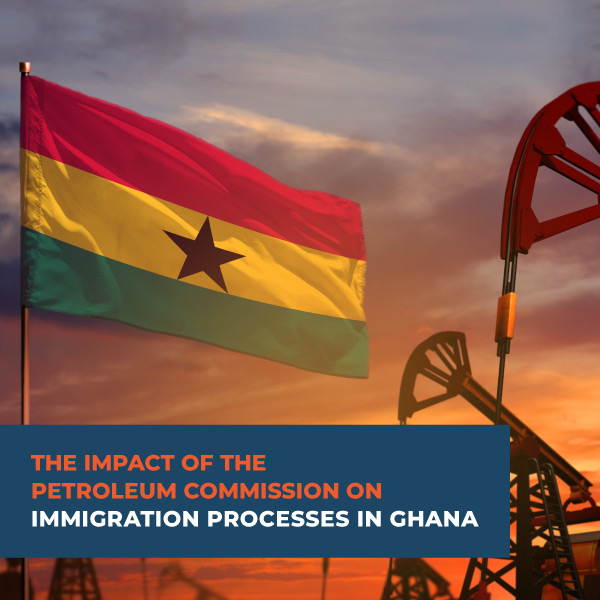THE IMPACT OF THE PETROLEUM COMMISSION
ON IMMIGRATION PROCESSES IN GHANA
Ghana’s export economy is thriving following being named the 70th largest export economy in the world in 2017. Furthermore, its oil and gas industry is booming with a recorded export of $2.97 billion of crude petroleum in 2017, according to the Observatory of Economic Complexity.
As such, Ghana has taken important steps to ensure its oil and gas industry continues to be successful and well-regulated after the discovery of oil and gas for commercial use in 2007. The unique space of the oil and gas industry, however, indicates a necessity to bring in specialised skill sets in the areas of welding, pipefitting, electrical and NDT technicians, and drilling. The knowledge and experience required to operate in such areas are not always readily available in the local workforce. As such, many international companies seek to employ highly qualified and experienced individuals from abroad to undertake specialized tasks and work in their oil and gas operations in Ghana.
How does one qualify for a Work Permit in Ghana?
A successful application for a work permit, whether short-term or long-term, includes sufficient motivation that members of the local Ghanian workforce were not able to meet the qualification criteria and/or experience required for the relevant position. Companies, therefore, must ensure positions are adequately advertised, and the labour market-tested, in order to provide sufficient proof thereon. The evidence is used to build a substantial case that is presented to the Petroleum Commission as motivation that an expatriate is indeed required and the skill is deemed critical for the projects at hand for the successful running of the oil and gas operations.
What is the petroleum commission?
The Petroleum Commission in Ghana was established in 2011 to regulate the activities within the oil and gas sector which is inclusive of local content and local participation regulations, as well as playing a role in the job creation and protection of the local Ghanaian workforce in the sector. Although the Petroleum Commission has a wide array of responsibilities in the oil and gas sector, it plays an integral role in the immigration processes for companies in Ghana that are registered under this sector and looking into employing key expatriate skillsets in-country.
What is the role of the petroleum commission?
As such, where an expatriate is required to conduct work in Ghana for a period between 6 months or more, the Petroleum Commission regulates through an additional layer, that includes assessing and evaluating applications to on-send to the Ghana Immigration Services. Upon finalisation of the application, the Petroleum Commission issues a recommendation on the duration of the permit for successful applications. The Petroleum Commission also reserves the right to request for additional information from the Ghanaian employer or to refuse an application.
Skills Transfer
Furthermore, in the case of long-term applications, Ghanaian understudies must be identified along with detailed succession plans to satisfy the Petroleum Commission’s mandate to protect the local workforce and job creation for Ghanaian nationals. Nevertheless, companies under the oil and gas sector must not be daunted by the additional requirements as set forth by the Petroleum Commission, however, they must bear in mind and ensure they comply with the requirements and seek forth to develop and train Ghanaians as part of their development plans when setting up its oil and gas operations in Ghana.
In conclusion, through companies ensuring compliance with the Petroleum Commission’s requirements for successful work permit applications in the oil and gas sector, they can promote the training and development of the local workforce and enable the sector to acquire the necessary skills needed for oil and gas operations.
AUTHOR

Tarissa Wareley
Immigration Consultant



